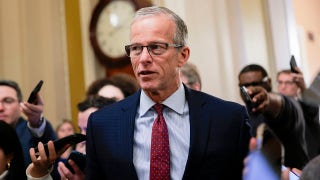The Obama administration is scrambling to contain an emerging diplomatic crisis in the Middle East, as Israel's closest Muslim allies lash out at the country in a string of demonstrations some fear could jeopardize an already-fragile peace.
The latest flare-up occurred over the weekend, when hundreds of protesters in Cairo stormed the Israeli embassy, forcing Israeli diplomats to flee. That comes on top of a prior clash between Egyptian and Israeli officials after Palestinian militants coming by way of the Sinai Peninsula attacked Israeli targets last month. Three Egyptian officers were killed as Israel returned fire.
To make matters worse, Turkey earlier this month moved to expel Israel's ambassador and downgrade diplomatic ties, escalating a long-simmering dispute over Israel's raid last year on a Gaza-bound Turkish ship.
This all comes in the run-up to a planned vote at the United Nations on Palestinian statehood, which has the potential to fuel more unrest along the Israeli border regardless of the outcome.
"It's going to be a bad week for Israel," John Bolton, former U.S. ambassador to the United Nations, said.
The clashes also present problems for the United States, which stands to lose influence in the region if long-standing alliances begin to break apart. A foremost concern is whether the seminal 1979 peace treaty between Egypt and Israel is on the verge of being scrubbed.
"This is part of the dark side of the Egyptian revolution," said Robert Satloff, director of The Washington Institute for Near East Policy. "The Egypt-Israel peace treaty is the foundation of everything we've done in the Middle East for the last 30 years. ... You're back to zero-point if that treaty falls apart."
President Obama and top U.S. officials were on the phone over the weekend with regional counterparts trying to bring the clashes at the Israeli embassy in Cairo under control and dial back tensions.
"This was an extreme incident. It was a very serious incident. That's why not only the U.S., but governments around the region swung into action to try to restore calm and to try to ensure that the right things were said on both sides," State Department spokeswoman Victoria Nuland said Monday. "It's not simply about this isolated incident. It's about the importance of maintaining stability and peace across the region. ... The Egyptian government has made clear that they regret this, that they are taking steps. They did take steps. So we are hoping that it was indeed an isolated incident."
After working with the Egyptians to ensure the embassy was protected, the U.S. turns next to the upcoming vote at the United Nations in New York over Palestinian statehood. The Obama administration repeatedly has said that statehood can only be achieved through negotiations with the Israelis and has threatened to veto the proposal should it come before the U.N. Security Council.
But the Palestinians could circumvent the Security Council and go straight to the General Assembly, asking for "observer-state" status. This could mark a symbolic win of sorts for the Palestinians, but U.S. officials stressed that going through the U.N. in any capacity will not achieve statehood in the real world.
"The only realistic path for the Palestinians to realize their aspirations is direct negotiations," White House Press Secretary Jay Carney said Monday. "You won't get it through the U.N."
But the vote itself causes potential problems for the U.S. and Israel.
Turki al-Faisal, a former Saudi ambassador to the U.S., wrote in The New York Times that his country "would no longer be able to cooperate with America in the same way it historically has" if the U.S. opposes the statehood bid.
"A veto will have profound negative consequences," al-Faisal warned.
Satloff said it showed a lot of "chutzpah" for a Saudi official to speak in such terms on the 10th anniversary of the Sept. 11 attacks -- carried out mostly by Saudi hijackers.
Satloff said the more significant implication from the U.N. campaign pertains to the reaction on the ground in Israel. If the resolution passes and has little impact on the situation in the West Bank, he said, "this could propel very substantial anti-Israel and perhaps anti-(Palestinian Authority) demonstrations."
Still, he described the U.N. vote as "child's play" compared with the possibility of a voided Egypt-Israel peace treaty. Without that bedrock, he said, the Egyptians could be nudged into conflict with the Israelis by radical elements in the region.
"This is a moment when the president needs to engage," Satloff said.













































